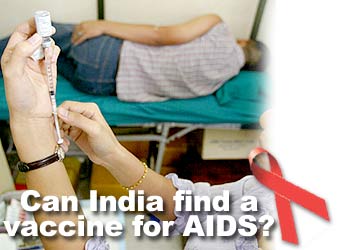
Even as World AIDS Day is observed on Wednesday, India is preparing for a unique trial on humans of an indigenously developed AIDS vaccine.
By early next year India will put to test the vaccine on at least 10 individuals in the age group of 18 to 55 years.
Experts call it India's first-ever mammoth medical project. If the first phase succeeds, India could become the first country to develop an effective vaccine to fight AIDS.
No wonder then that these days a clutch of top medical institutes and organisations across India under the health ministry are feverishly preparing for the trials.
The main players include the Indian Council of Medical Research, the National AIDS Control Organisation, the National AIDS Research Institute and the National Institute of Cholera and Enteric Diseases.
Partnering the pivotal Indian project are the New York-based International AIDS Vaccine Initiative and the US-based biotech giant Therion Biologics.
Not many know how and where the first phase of the clinical tests will be held and what its implications will be.
rediff.com has gathered the following details after talking to a number of officers and experts behind the project:
**NARI at Pune is the nodal agency for recruiting volunteers and conducting the trials, which will be done at a centre specially designed and set up by NARI at Pune itself.
**The Kolkata-based National Institute of Cholera and Enteric Diseases has already developed the vaccine in collaboration with Therion Biologics. It is currently undergoing pre-clinical trials on mice. The vaccine has been made appropriate for use in India. In other words, the vaccine has been tailored to the HIV strain C, the subtype of the virus most common in the country.
**During clinical trials, medical scientists will test whether the vaccine has the potential to stimulate the production of immune cells that kill cells infected with HIV. The trials will also determine the safety, immunogenicity (ability to induce strong immune responses in a person to fight HIV) of the intramuscular vaccine, preliminary dose requirement and schedules for immunisation.
**The trials, beginning in March 2005, will be held in three phases spanning nearly eight years. So hundreds of Indian volunteers will be required for the project.
**But it has not been easy for NARI to recruit volunteers. Its teams are these days meeting potential volunteers to explain to them what the trials mean and to tell them that the process is harmless.
**The International AIDS Vaccine Initiative is a New York-based global non-profit scientific organisation working to speed the search for an HIV/AIDS vaccine. IAVI sponsors research partnerships to develop and test promising vaccine candidates. IAVI's major financial supporters include the Bill & Melinda Gates Foundation, Rockefeller, Sloan and Starr foundations and the World Bank.
**IAVI has four vaccine development partnerships for African countries. India is IAVI's fifth AIDS vaccine tie-up for clinical trials on humans.
**According to IAVI President Dr Seth Berkley, development of an AIDS vaccine is crucial for a country like India because life-saving vaccines do not reach developing countries for 15-20 years after they are introduced in the West. "Ideally, for India, you need an oral vaccine with a single dose and one which is stable at room temperatures to make distribution easier," Dr Berkley says.
**More than 40 HIV vaccines are being tested around the world, but none has succeeded till date.
The health ministry is ecstatic about the mission. Its records say there are 57,781 AIDS cases, besides an estimated 4.58 million HIV cases, in the country. Andhra Pradesh, Karnataka, Nagaland, Manipur, Maharashtra and Tamil Nadu are regarded as high-risk states for the disease.
According to NARI's Ramesh Paranjape, the institute is giving finishing touches to the trials. "We are confident it will be successful."
But some health activists are sceptical. They say India has a long history of drug companies and governments not following ethical standards and strict scientific procedures during vaccine trials.
"We are concerned about the lack of transparency for the proposed trials. The history of clinical trials in Asia shows that ethical guidelines become the first casualty," says Dr P V Unnikrishnan, a known health activist and spokesperson for ActionAid Asia.
"The risk factors of undergoing clinical trials must be explained to the volunteers before their commencement," he adds.
Dr Unnikrishnan says while the preventive vaccine is useful, the need of the hour is to develop a therapeutic one. Moreover, a robust regulatory framework and ethical guidelines are necessary for clinical trials, he adds.
"Western nations often use countries like India for clinical trials of pharmaceutical products developed there," he notes, adding, "we hope the AIDS vaccine does not go down as that kind of a project."
Photograph: Paula Bronstein/Getty Images | Headline Image: Rahil Shaikh





